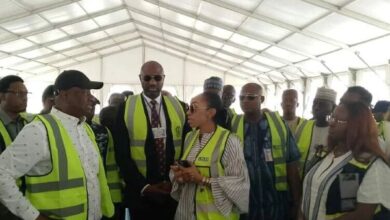Canada seeks policy to drive investments in Nigeria’s mining, agric sectors
 Canada’s Senior Trade Commissioner to Nigeria, Mr Teshome Nkrumah, has called for a trade policy to drive investments in the mining and agricultural sectors of the Nigerian economy.
Canada’s Senior Trade Commissioner to Nigeria, Mr Teshome Nkrumah, has called for a trade policy to drive investments in the mining and agricultural sectors of the Nigerian economy.
Nkrumah, also Deputy High Commissioner of Canada to Nigeria, said this on Thursday in Lagos at the Business Roundtable of the Nigerian-Canadian Business Association (NCBA).
The News Agency of Nigeria (NAN) reports that the event had as its theme: “Creating Opportunities for Fresh Foreign Direct Investment into the Nigerian economy.”
He noted that bilateral investments between both countries was at about 1.6 billion dollars, with Canada benefiting more with a flow estimated at 1.2 billion dollars.
“You would expect that the size of investments into Nigeria would exceed that going to Canada.
“This means that there is the need to put structures, the right framework and enabling environment in place as trade could only occur in the face of an enabling environment,” he said.
Nkrumah furthered stated that Canada’s 100 million dollars of mining investments in Nigeria showed that the country was slow and precautionary to invest in the mining sector.
He noted that Nigeria’s agricultural space was taking off and that Canada understood the tremendous opportunities in agriculture as the country exported over 82 billion dollars of agricultural produce yearly to many countries.
According to him, investments from Canada in the agricultural sector in Nigeria, which is one quarter of the Gross Domestic Product of Nigeria, means that there are tremendous opportunities yet to be explored in the country.
He stressed that Nigeria needed to have in place mechanisms such as investors protection framework to keep investments protected and give confidence to investors.
“We concluded such an agreement between both countries in 2013 and signed in 2014 with Canada completing the ratification process while Nigeria did not ratify that agreement.
“In February this year, we revisited the need for the framework instruments and what we have been told is that, there is need to attract the type of investments that would qualitatively add to the economy of the country.
“Nigeria needs to define what constitutes an agreement that adds value to the economy.
“Canada’s agricultural sector is one of the lifeblood of the economy as we have adequate understanding of the agricultural value chain and international competitive advantage, in several key elements of the supply chain.
“Nigeria has over 28 minerals in exportable quantities but there’s need to de-risk transactions and address macroeconomic issues of insecurity, foreign exchange challenges, and financing.
“These things send signals to investors in Canada that doing business in Nigeria is not only with high reward, but the risk is manageable,” he said.
Mrs Ebi Obaro, Chairperson, NCBA, noted that like many developing countries, Nigeria was experiencing a youth bulge entering the labour market.
She, however, noted that the economy could not absorb these workers or even provide a good living standard and reduce poverty.
“The private sector has a key role to play in creating a productive and critical element in improving the economic climate to attract both domestic and foreign private investments.
“These investments, as a vital factor in sustainable and broad-based growth, will move the country into middle or upper-income status through foreign private capital flows like bank lending, direct investment and portfolio investment (i.e., debt and equity).
“These would expand the potential sources of capital available to countries, raising productivity and boosting growth,” she said.
She reiterated the chamber’s commitment to representing the interest of local and foreign investors through promotion of the general business environment.











